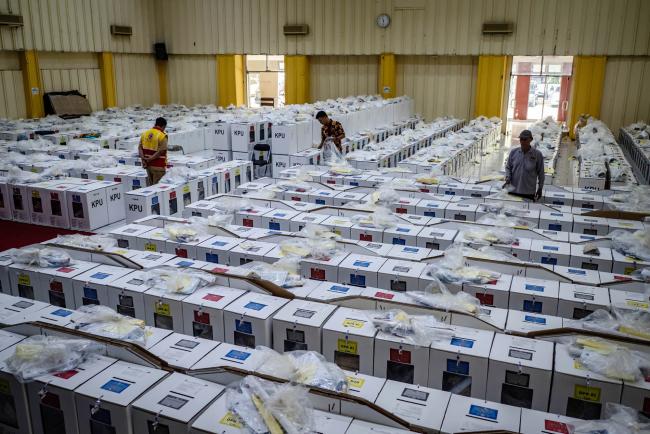(Bloomberg) -- Indonesians are voting today in a presidential election that’s seen jobs and the cost of living at the heart of the sometimes bitter fight for control of Southeast Asia’s biggest economy.
Polling stations were scheduled to open at 7am in local time zones across the country, with about 193 million people eligible to vote. Provisional results were expected shortly after polls close at 1pm.
A re-run of the 2014 race, the contest again pits former furniture exporter Joko Widodo, now the incumbent, against ex-general Prabowo Subianto. Widodo, known as Jokowi, has vowed to create 100 million jobs over the next five years while Prabowo has tax cuts and a plan to revive Indonesia’s manufacturing industry as the key focus of his economic platform.
Crucially, it’s also the country’s first simultaneous presidential and legislative elections. It will not only decide who leads Indonesia but will shape the parliament, and therefore the landscape for reform -- as well as the investment climate -- over the next five years.
Inflation is at a near-decade low and the jobless rate close to its lowest in 20 years. Still, the economy has been growing at about 5 percent and well short of the 7 percent target put forward by Jokowi when he entered office in 2014.
That’s left Jokowi open to attack, with Prabowo railing at the level of economic growth as well as Indonesia’s ballooning current account deficit, which last year was near 3 percent of gross domestic product. Prabowo -- who helped bring Jokowi to national prominence by backing his successful bid in Jakarta’s gubernatorial race in 2012 –- has for his part tried to paint a picture of disparity in the economy.
“The big advantage Prabowo has this time compared to last time is that Jokowi was full of potential and people could respond to him and project into him their hopes and aspirations,” Greg Barton, professor of global Islamic politics at Deakin University in Australia, said ahead of the vote. But Jokowi now has “some scratches and dents” from his first term, he said.
Backdrop of Unrest
Two years ago, the Prabowo-backed pair of Anies Baswedan and Sandiaga Uno won a divisive gubernatorial election in the capital Jakarta. That race, dominated by mass street protests aimed ousting then-incumbent Basuki Tjahaja Purnama, a Chinese Christian and Jokowi ally later jailed for insulting the Koran, is seen as having boosted Prabowo’s stocks ahead of his 2019 run at the presidency.
It’s also seen the 2019 election race set against the backdrop of a growing influence of conservative Islam in the world’s biggest Muslim-majority nation, and to many observers prompted Jokowi to pick a leading Muslim cleric in Ma’ruf Amin as his running mate. That move, according to Barton, tipped Prabowo toward picking Uno, a U.S. educated businessman.
It also put him “on a trajectory towards talking about the economy,” Barton said.
